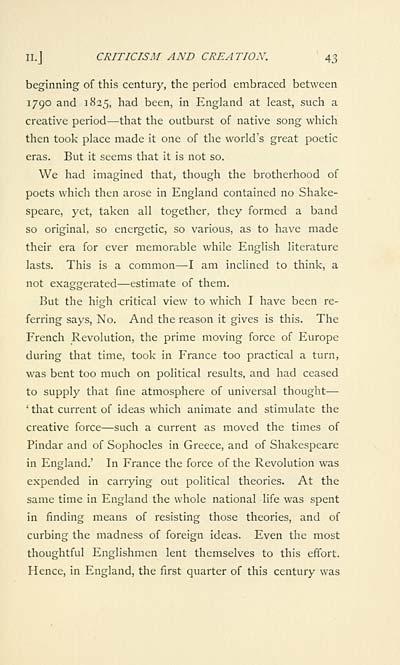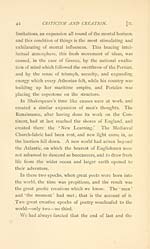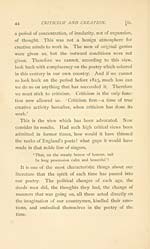Download files
Complete book:
Individual page:
Thumbnail gallery: Grid view | List view

II.J CRITICISM AND CREA TION. 43
beginning of this century, the period embraced between
1790 and JH25, had been, in England at least, such a
creative period — that the outburst of native song which
then took place made it one of the world's great poetic
eras. But it seems that it is not so.
We had imagined that, though the brotherhood of
poets which then arose in England contained no Shake-
speare, yet, taken all together, they formed a band
so original, so energetic, so various, as to have made
their era for ever memorable while English literature
lasts. This is a common — I am inclined to think, a
not exaggerated — estimate of them.
But the high critical view to which I have been re-
ferring says, No. And the reason it gives is this. The
French Revolution, the prime moving force of Europe
during that time, took in France too practical a turn,
was bent too much on political results, and had ceased
to supply that fine atmosphere of universal thought —
' that current of ideas which animate and stimulate the
creative force — such a current as moved the times of
Pindar and of Sophocles in Greece, and of Shakespeare
in England.' In France the force of the Revolution was
expended in carrying out political theories. At the
same time in England the whole national life was spent
in finding means of resisting those theories, and of
curbing the madness of foreign ideas. Even the most
thoughtful Englishmen lent themselves to this effort.
Hence, in England, the first quarter of this century was
beginning of this century, the period embraced between
1790 and JH25, had been, in England at least, such a
creative period — that the outburst of native song which
then took place made it one of the world's great poetic
eras. But it seems that it is not so.
We had imagined that, though the brotherhood of
poets which then arose in England contained no Shake-
speare, yet, taken all together, they formed a band
so original, so energetic, so various, as to have made
their era for ever memorable while English literature
lasts. This is a common — I am inclined to think, a
not exaggerated — estimate of them.
But the high critical view to which I have been re-
ferring says, No. And the reason it gives is this. The
French Revolution, the prime moving force of Europe
during that time, took in France too practical a turn,
was bent too much on political results, and had ceased
to supply that fine atmosphere of universal thought —
' that current of ideas which animate and stimulate the
creative force — such a current as moved the times of
Pindar and of Sophocles in Greece, and of Shakespeare
in England.' In France the force of the Revolution was
expended in carrying out political theories. At the
same time in England the whole national life was spent
in finding means of resisting those theories, and of
curbing the madness of foreign ideas. Even the most
thoughtful Englishmen lent themselves to this effort.
Hence, in England, the first quarter of this century was
Set display mode to: Large image | Transcription
Images and transcriptions on this page, including medium image downloads, may be used under the Creative Commons Attribution 4.0 International Licence unless otherwise stated. ![]()
| Early Gaelic Book Collections > Ossian Collection > Aspects of poetry > (59) |
|---|
| Permanent URL | https://digital.nls.uk/78385980 |
|---|
| Description | Selected books from the Ossian Collection of 327 volumes, originally assembled by J. Norman Methven of Perth. Different editions and translations of James MacPherson's epic poem 'Ossian', some with a map of the 'Kingdom of Connor'. Also secondary material relating to Ossianic poetry and the Ossian controversy. |
|---|
| Description | Selected items from five 'Special and Named Printed Collections'. Includes books in Gaelic and other Celtic languages, works about the Gaels, their languages, literature, culture and history. |
|---|

